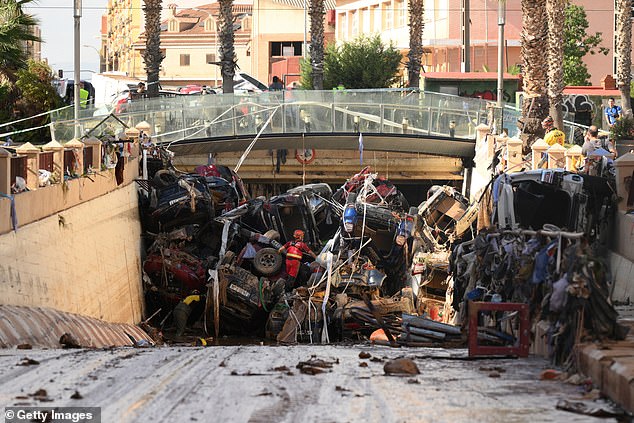The Valencia flood death toll has reached 202, as survivors have been pleading for aid as they have no food or water to live on, amid warnings that Spain will be battered by another round of storms.
Residents of the decimated city told local media that they are terrified for their lives, as authorities try to count the dead.
‘This is a disaster. There are a lot of elderly people who don’t have medicine. There are children who don’t have food. We don’t have milk, we don’t have water. We have no access to anything,’ a resident of Alfafar, one of the most affected towns in south Valencia, told state television station TVE.
‘No-one even came to warn us on the first day.’
Juan Ramon Adsuara, the mayor of Alfafar, one of the hardest hit towns, said the aid is not nearly enough for residents trapped in an ‘extreme situation’.
‘There are people living with corpses at home. It’s very sad. We are organising ourselves, but we are running out of everything,’ he told reporters.

More than 200 people have so far been killed by the flooding

People remove mud from the street on November 1, 2024 following the devastating effects of flooding on a residential area in the town of Massanassa, in the region of Valencia, eastern Spain

This picture taken on November 1, 2024 shows the devastating effects of flooding on a residential area in the town of Massanassa, in the region of Valencia, eastern Spain
‘We go with vans to Valencia, we buy and we come back, but here we are totally forgotten.’
Residents in communities like Paiporta, where at least 62 people died, and Catarroja, have been walking miles to Valencia to get provisions, passing neighbours from unaffected areas who are bringing water, essential products or shovels to help remove the mud.
Social networks have channelled the needs of those affected.
Some posted images of missing people in the hope of getting information about their whereabouts, while others launched initiatives such as Suport Mutu, or Mutual Support, which connects requests for help with people who are offering it.
Others organised collections of basic goods throughout the country or launched fundraisers.
It comes as Spanish authorities have warned citizens to brace for more heavy storms, which could push the already-high death toll even further.
Alerts for strong rains, like those experienced in Valencia, have been issued in Tarragona, Catalonia, and part of the Balearic Islands.

Members of the fire brigade, which are part of a search and rescue unit, carry out work as cars and debris block a tunnel after the recent flash flooding in the nearby municipality Benetusser on November 1, 2024 in the Benetusser municipality of Valencia, Spain

Floods swept cars and vans and dumped them across the city

Spain’s Mediterranean coast is used to autumn storms that can cause flooding, but this was the most powerful flash flooding in recent memory
Spain’s Mediterranean coast is used to autumn storms that can cause flooding, but this was the most powerful flash flooding in recent memory.
Scientists link it to climate change, which is also behind increasingly high temperatures and droughts in Spain and the heating up of the Mediterranean Sea.
Human-caused climate change has doubled the likelihood of a storm like this week’s deluge in Valencia, according to a partial analysis issued on Thursday by World Weather Attribution, a group made up of dozens of international scientists who study global warming’s role in extreme weather.
Spain has suffered through an almost two-year drought, making the flooding worse because the dry ground was so hard it could not absorb the rain.
In August 1996, a flood swept away a campsite along the Gallego river in Biescas, in the north east, killing 87 people.
More to follow.
This article was originally published by a www.dailymail.co.uk . Read the Original article here. .

